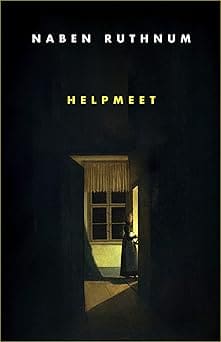
Synopsis:
It’s 1900, and Louise Wilk is taking her dying husband home to Buffalo where he grew up. Dr. Edward Wilk is wasting away from an aggressive and debilitating malady. But it’s becoming clearer that his condition isn’t exactly a disease, but a phase of existence that seeks to transform and ultimately possess him.
Review:
Dripping with despair and rich with some of the nastiest body horror this side of Cronenberg, “Helpmeet,” by Naben Ruthnum is a domestic gothic that dissects themes of love, shame and ownership. Marrying the visceral unease of contemporary authors such as Eric Larocca, with the classical elegance of greats like Henry James, Ruthnum’s prose is indulgent- as beautiful as it is grotesque. This one weighs in at a slight 94 pages, yet could quite easily fill a full length novel with its examination of human relationships, existential ponderings, and eventual dalliance with the cosmic. If you’re a strange person, looking for a strange but excellent book, then look no further.
It’s November 1900, and Doctor Edward Wilk is falling apart… literally. Having been consistently unfaithful to his wife Louise, his comeuppance comes in the form of a vicious disease. When Dr. Garnier concludes that Edward is not suffering from syphilis, and is ailed with something that he’s never seen before, Louise is unconvinced, but every shred of scepticism is swiftly stamped out when her husband’s nose falls off. It’s followed by the eyes. Which are followed by drastic weight loss. Pale and frail, Edward is completely reliant upon his wife, and is certainly not getting better. Knowing this, he decides that if he’s going to die, his swan song is to take place in an old Wilks’ family home just outside of Buffalo. All his beloved wife has to do is haul his rapidly deteriorating ass there.
Ultimately, “Helpmeet,” is a story of ownership. The possession of another. A “helpmeet,” is defined as “A helpful companion or partner, especially one’s husband or wife,” an outdated concept that Ruthnum warps into the depraved. Edward Wilk is a morally bankrupt, serial adulterer, manipulator and knobhead. There’s no reason for Louise to stay with him- whatsoever… at all. When he begins literally decomposing, a disease that he would not have contracted but for being a cheating scumbag, you would think and hope that Louise would run, yet she doesn’t- tending to him with a devotion that borders on self-erasure. It takes a real, raw kind of love to swap out your husband’s eye-socket-cotton-ball-substitutes without gagging… His control over Louise persists even as his body crumbles, a dynamic that is infuriating, but reflective of the societal constraints of 1900.
Despite her unwavering loyalty to her rather insufferable husband, Louise does seem to harbour a resentment toward the expectation she should be grateful for what little she has. There’s a shift in power dynamics when Edward realises he is dying, and can’t get to Buffalo without the help of the wife he has forsaken for so long. It’s Louise who renegotiates their relationship on the brink of death, now the provider and caregiver, she knows him well, psychologically and physically- facts that take their one-sided relationship, and shift that power to the other side. In a bizarre, supernatural twist, Louise takes literal ownership over her husband- something we won’t discuss for spoiler’s sake, but figuratively it seems that Ruthnum is asking us to consider what it means to belong to someone, and the impact of power within relationships.
As Edward Wilk falls to pieces, we’re left with a story as much about human relationships as it is about… human decomposition. Brief, but profound, deeply unsettling, and… sticky, “Helpmeet,” is a novella that will continue to linger and gnaw, leaving me disturbed and impressed… but mainly disturbed.









Leave a Reply